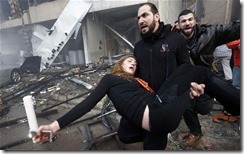In Lebanon, I’d say half of the population parks the cars of the other half. And when they are not parking cars, valet youngsters roam around the streets with scooter bikes reserving spots for potential customers.
You also have another sizable portion, serving as security guards for residential areas, political figures, and other “big projects”. Say, Saifi village, or very recently now the Sanayeh gardens. Imagine! Who would have thought that a garden needs a security guard? But in Lebanon all gardens (and there are maybe 3 in total with a maximum of 5 trees in them) have security guards.
But someone might ask what is the relationship between security guards and valet parking. I have to say it took me a while to find it but here it is.
Well, to start with, it makes streets a very unfriendly and unpleasant place to be. Valet parking constantly bully you as you attempt to park in a spot they decided to reserve to themselves. And security guards complain for anything they could invent on the spot in order to demonstrate that walking from here, or parking your car there, is a security hasard, just to demonstrate that they have some form of power in the most Kafkaesque of fashions.
But most importantly, these are jobs that don’t produce anything socially useful, they don’t promote useful communitarian values. They cultivate relations of subservience of one class to another and reinforce whatever social structure are in place to define different communities (in the case of Lebanon read as the confession).
I’m not a “unionist” preacher, whatever that means, but Lebanese are divided socially and this is reinforced by the way streets are populated, the way streets are uninviting to any human individual who is circulating just to breath air or look around.
People are astonished that confessionalism is so deeply entrenched in Lebanon but confessionalism is in every social act you undertake from the moment you are born until the day you die (and afterwards). And Liberalism as an economic project goes hand in hand with this type of social structure because it makes everything security sensitive which constrains people to fall back on their communities.
Marx was not wrong to think that capitalism wrecks any traditional social system and erects new classes continuously. But liberalism which is the ideological backbone of capitalism is obsessed with security, with domestification, gentrification. It does not care about classes in a material sense but preserves a “culture” of social categories.


